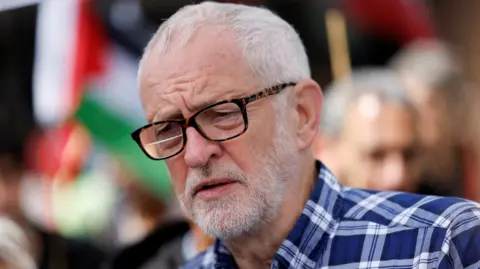In a momentous announcement that reverberates through the political landscape of the UK, Jeremy Corbyn, the former leader of the Labour Party, has officially confirmed the formation of a new political party. This development appears to be a culmination of ongoing discussions and rumors surrounding Corbyn’s intentions to rally leftist supporters who feel disenchanted with the current political frameworks. The emergence of this new party signifies an effort to establish a grassroots, democratically-driven political entity, revitalizing Corbyn’s vision centered around community engagement.
In a cooperative statement with Zarah Sultana, who recently departed from Labour to serve as an independent, Corbyn articulated a vision for a new political party: “It’s time for a new kind of political party – one that belongs to you”. This assertion underscores the duo’s commitment to creating a platform accessible to the populace, aspiring to counter what they perceive as a “rigged” political system. The pair is actively urging supporters to participate in the formation of this entity, highlighting a foundational conference aimed at enlisting community members who resonate with their ideals.
Notably referred to as “Your Party”—a name which may only be temporary—the website suggests a broader ambition beyond its current moniker. Sultana has explicitly communicated that the party’s official name has not yet been finalized, fostering curiosity regarding how this new political entity will be perceived. Currently, “Your Party” remains unregistered with the Electoral Commission, an essential step for any political party intending to contest elections, indicating that there are considerable organizational hurdles to overcome as they move forward.
The newly formed entity is reportedly aiming to field candidates in upcoming local elections, emphasizing a desire to become part of the political discourse on a more localised level. This ambition is perhaps further fueled by the recent political turbulence within the Labour Party, where allegations of discontent among progressive factions have surfaced, particularly among those who supported Corbyn during his leadership tenure.
Rumors about a Corbyn-led party had been gaining traction for months before Sultana’s declaration that she would transition to co-founding a new political movement with him. This bold maneuver comes after Sultana, previously suspended from the Parliamentary Labour Party (PLP) last year, publicly supported a proposal to scrap the two-child benefit cap—a topic that illuminated rifts within Labour’s stance on welfare and support issues. The departure of Sultana from Labour appears to align with a broader trend of discontent among certain factions who seek a more leftist agenda.
Corbyn’s own political journey has been marked by significant upheaval; after being suspended from Labour in 2020, he successfully ran as an independent in the 2024 general elections. His experience, combined with a small alliance of independent MPs who share his perspectives—especially those concerned about the ongoing Israel-Gaza conflict—could serve as the cornerstone for this new party, potentially bolstering its base as it seeks to attract disenfranchised voters from varying demographics.
The announcements surrounding this new political venture offer a hopeful yet cautious narrative for proponents of progressive politics in the UK. As Corbyn and Sultana forge this new path, they are navigating the complexities of registering the party, structuring its leadership, and articulating a clear policy agenda that resonates with increasingly diverse constituencies. With the promise of a more inclusive, community-rooted political climate, the future of this initiative remains under avid scrutiny, as it seeks not only to challenge entrenched political norms but also to invigorate a segment of the electorate yearning for change.
Thus, Jeremy Corbyn’s reaffirmation of his commitment to shaping a new leftist political movement marks a significant moment in UK politics—one that may very well redefine the parameters of grassroots political engagement in the coming years.











